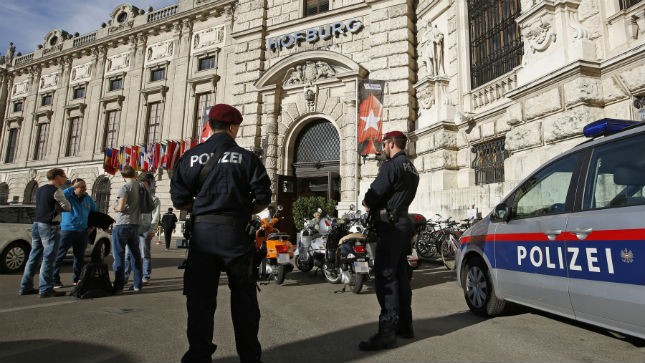Being an international city, Vienna has a strict security system to ensure the safety of its citizens and properties. Entry and exit points are always on the guard on a regular basis and additional security is provided in cases of emergencies or advanced warnings of terror attacks.
With the recent terrorist attacks in Brussels, the Austrian capital has also beefed up its security to protect its residents and visitors.
 At the Vienna international airport and metro station, for instance, additional police checks are being implemented. Local government and law enforcement authorities are in constant communication to monitor all activities at the airport. Flights between Vienna and Brussels were immediately cancelled after the attacks.
At the Vienna international airport and metro station, for instance, additional police checks are being implemented. Local government and law enforcement authorities are in constant communication to monitor all activities at the airport. Flights between Vienna and Brussels were immediately cancelled after the attacks.
Recommended Steps
Some analysts have pointed out the need to carry out behavioural analysis techniques instead of the usual profiling procedure to detect suspicious activities. They say profiling is more focused on specific races while behavioural analysis will determine if a person behaves in an unusual or nervous manner while interacting with his surroundings.
To check behaviour, experts recommend training people working at airports to be more observant and to immediately report unusual things and acts they see. This should cover the staff at shops and check-in counters, cleaners, caterers and restaurant managers.
In addition, more security personnel including undercover and plain-clothed ones should be deployed in various public areas such as the terminal entrances, on trains that proceed to the airport and within the airport complex itself.
Another effective move would be to use more police dogs at various spots particularly within the airport and public transport terminal complexes. This way, terrorists would not feel too confident while going through airport security. Dogs are more alert than humans and when they are present and on the move, terrorists may find it hard to plan their moves.
Police Services
Police services in Vienna involve the security police, market police, sanitary police, building inspection department and the police section in charge of events and related tasks. Today, the Austrian capital has a single Federal Police Department after three formerly separate institutions were merged. The Directorate General for Public Security takes the lead in law enforcement in Austria.
The Austrian police is manned by some 27,500 men and women serving in the country’s nine states. The police force takes charge of almost 900 police stations and more than 80 specialized stations.
On the Alert
 Police in Vienna and the entire Austria were already on the alert in December last year after receiving warnings of a possible attack in European capitals between Christmas and the New Year. According to ‘friendly’ intelligence service, the attack targeting large crowds could either involve shooting or the use of a bomb. The warning came six weeks after the militant Islamist bombing and shooting attacks in Paris where 130 people were killed.
Police in Vienna and the entire Austria were already on the alert in December last year after receiving warnings of a possible attack in European capitals between Christmas and the New Year. According to ‘friendly’ intelligence service, the attack targeting large crowds could either involve shooting or the use of a bomb. The warning came six weeks after the militant Islamist bombing and shooting attacks in Paris where 130 people were killed.
Following that warning, the Vienna police made sure to step up its security. Some extra steps they took were surveillance in crowded areas particularly at events and traffic hubs, intensive identity checks and higher alertness for objects that can carry explosives including bags and bicycle frames.
The embassies of various nations also issued travel advisories for their citizens around the world. They reminded travelers to exercise caution during the holiday season as well as during events and holiday festivals. Specifically, they advised their people to be alert and to stay away from large crowds or crowded places.
Three bombings occured in Brussels on March 22 claiming the lives of 33 people including the three suicide bombers and injuring 300 others. Two bombs exploded at the Brussels Airport in Zaventem and one at the Maalbeek metro station. The ISIS group claimed responsibility for the attacks.
Reports noted the bombings were the deadliest form of terrorism the history of Belgium. Three days of mourning were declared by the Belgian government following the incident.
How to Travel Safely in Vienna
With so much to explore around Vienna, visitors in the Austrian capital should take the necessary precautions to ensure their safe travels in and around the city. A very important step that one needs to take is to follow the rules of the city government at all times and it is encouraged that tourists planning a trip to Vienna should educate themselves in advance even before they travel. The locals are not exempted from adhering to the existing laws.
When visiting palaces, for example, there is rule that prohibits visitors from taking photos of the interior areas of the buildings as well as of the objects (masterpiece artworks, utensils and furnishings) displayed there. This applies to the Hofburg, Schonbrunn and Belvedere Palaces except in the Silver Collection of the Hofburg Palace). People can only take pictures of posters, photos and dioramas posted at the entrance of the palaces.
For those driving a rental car, keep in mind that several districts in the city center of Vienna charge a parking fee during the day from Monday to Saturday between 9 a.m. and 10 p.m. Parking tickets can be bought from newspaper shops and they should be placed behind your windscreen.
Also when you see a crosswalk with no traffic lights, you need to stop your car if there’s somebody waiting to cross the street. This is a must especially in the mornings when children go to school otherwise, you can get a ticket for not following the law.
Motorists should as well give way to cyclists particularly when passing through the cycle paths. Vienna is one of the European cities known for its bicycle lifestyle and the cyclists there can go very fast.
Tourists who prefer to take the public transport should buy their tickets from the vending machines. Unlike in other countries where tickets are sold at booths with a person managing it, Vienna’s public transport system operates based on trust. The vending machines are the only source for public transport tickets and passengers must then validate the tickets on the blue stamping machines before boarding the underground trains. For those using the buses or trams, the tickets can be validated upon boarding. One ticket is worth 1.80 Euro which can be used for one journey within Zone 1. This covers trains, buses or trams and the ticket is allowed for use within one hour.
Be mindful that ticket controllers constantly check on public transports and when they catch people with no tickets, they would immediately tell them to disembark when the vehicle stops.





